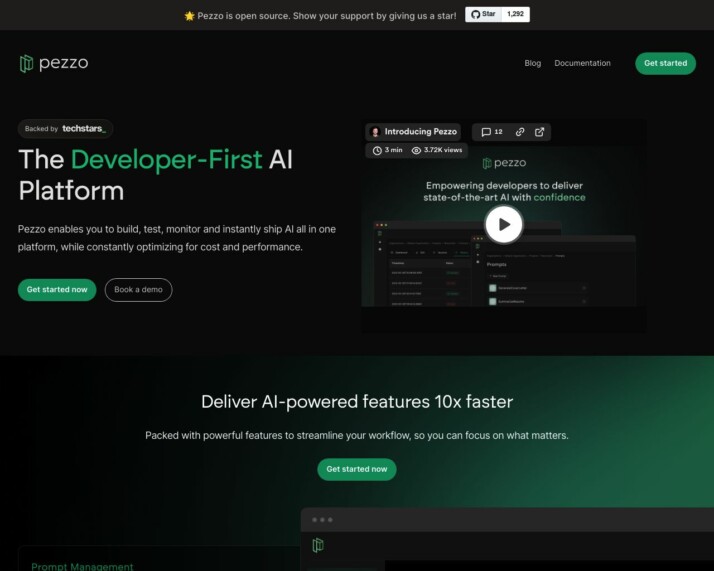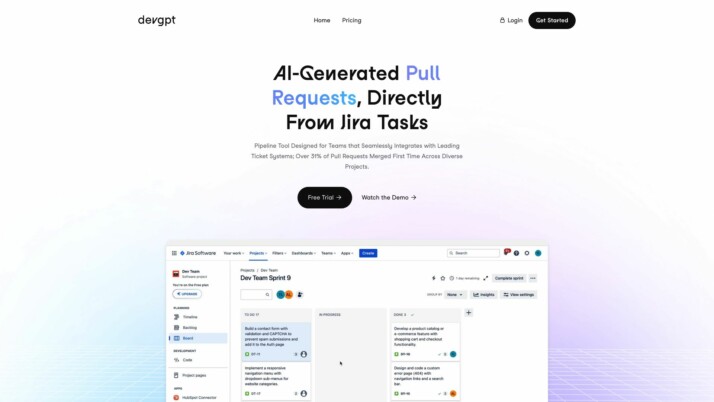Pezzo vs. DevGPT: AI Development Tools Compared
AI-powered development tools revolutionize software engineering, promising enhanced productivity and streamlined workflows. This review compares Pezzo’s open-source toolkit for AI development with DevGPT’s natural language code generation platform, exploring their distinct approaches to empowering developers. We evaluate each platform’s core strengths, limitations, and potential impact on software development processes. Our analysis covers key features, security considerations, and overall utility for various development scenarios. By examining these innovative tools alongside SmythOS, we provide a comprehensive guide to help technical teams, business leaders, and AI enthusiasts make informed decisions about integrating AI assistance into their development workflows.
Pezzo Overview
Pezzo empowers developers to streamline AI development through its open-source toolkit. The platform excels in prompt management, offering seamless version control and collaborative features that accelerate AI solution delivery. Pezzo’s standout capabilities include A/B testing for prompt optimization and comprehensive troubleshooting tools, enabling teams to deploy AI models with confidence.


Pezzo empowers developers to streamline AI development through its open-source toolkit. The platform excels in prompt management, offering seamless version control… that accelerate AI solution delivery.
Pezzo’s focus on efficiency extends to cost optimization, potentially reducing AI operation expenses by up to 50%. The platform provides detailed observability into AI processes, significantly reducing debugging time and enhancing team understanding of AI operations. This transparency is crucial for effective troubleshooting and maintaining efficient workflows.
Pezzo’s focus on efficiency extends to cost optimization, potentially reducing AI operation expenses by up to 50%.
While Pezzo offers robust tools for prompt design and management, it lacks some features found in more comprehensive AI development platforms. The absence of a visual builder or no-code editor may limit accessibility for non-technical users. Additionally, Pezzo does not provide built-in AI agents or autonomous agent capabilities, focusing instead on optimizing the development process for existing AI models and APIs.
Pezzo shines in its ability to enhance collaboration among development teams. The platform’s emphasis on transparency and detailed execution history fosters a more cohesive and informed approach to AI development. For organizations looking to improve their AI development workflow, particularly in terms of prompt management and operational visibility, Pezzo offers a compelling solution that addresses key pain points in the AI development lifecycle.
DevGPT Overview
DevGPT transforms natural language prompts into executable code, automating repetitive coding tasks for software developers. This open-source AI assistant integrates with GitHub and Jira to streamline pull request generation from tasks and tickets.


DevGPT leverages advanced models like GPT-4 and Codex to power its code generation capabilities. The platform trains on a developer’s codebase, producing code that matches their style and preferences. Users can edit and refine generated code through comments, tailoring output to specific needs.
Initial users report significant time savings, with over 10 hours per week reclaimed from repetitive coding tasks.
Initial users report significant time savings, with over 10 hours per week reclaimed from repetitive coding tasks. This productivity boost allows developers to focus on complex challenges and higher-level problem-solving.
While DevGPT excels at automating routine coding work, it lacks some advanced features found in more comprehensive AI development platforms. The current focus on individual developers and small teams may limit its scalability for larger organizations. Additionally, DevGPT does not offer visual builders or no-code options, requiring users to have coding knowledge.
DevGPT’s vision aims to expand accessibility from individuals to companies of all sizes, building an engaged community to drive future product development. As the platform evolves, it has the potential to become an indispensable AI-powered coding companion for a wider range of developers and software teams.
Feature Comparison
Pezzo and DevGPT offer distinct approaches to AI-assisted software development, with notable differences in their core components and security features. Pezzo excels in prompt management and operational visibility, providing developers with tools for version control, A/B testing, and detailed observability. This focus on transparency and collaboration streamlines the AI development process, potentially reducing costs by up to 50%. However, Pezzo lacks some advanced features found in more comprehensive platforms.
DevGPT, on the other hand, specializes in transforming natural language prompts into executable code, leveraging models like GPT-4 and Codex. It integrates with GitHub and Jira to automate pull request generation, saving developers significant time on repetitive tasks. DevGPT’s ability to train on a developer’s codebase allows for personalized code generation that matches individual styles and preferences.
In terms of security, both platforms have gaps. Pezzo’s documentation does not specify features like data encryption or OAuth support, which are crucial for enterprise-level deployments. Similarly, DevGPT’s security measures are not prominently highlighted, potentially raising concerns for organizations handling sensitive data.
Neither platform offers robust visual builders or no-code options, limiting accessibility for non-technical users. This contrasts with more comprehensive AI development platforms that prioritize user-friendly interfaces. Additionally, both Pezzo and DevGPT lack built-in AI agents or autonomous agent capabilities, focusing instead on enhancing specific aspects of the development process.
While both tools offer valuable features for streamlining AI-assisted development, they may not provide the full spectrum of capabilities required for complex, enterprise-scale AI projects. Organizations seeking more comprehensive solutions might need to look beyond these platforms for features like advanced security measures, visual development tools, and support for autonomous AI agents.
Feature Comparison Table
| Pezzo | DevGPT | SmythOS | |
|---|---|---|---|
| CORE FEATURES | |||
| Hosted Agents (Dev, Production) | ❌ | ❌ | ✅ |
| Environments (Dev, Production) | ✅ | ❌ | ✅ |
| Visual Builder | ❌ | ❌ | ✅ |
| No-Code Options | ❌ | ❌ | ✅ |
| Memory & Context | ❌ | ✅ | ✅ |
| Autonomous Agents | ❌ | ❌ | ✅ |
| Explainability & Transparency | ✅ | ❌ | ✅ |
| Multimodal | ✅ | ❌ | ✅ |
| Multi-Agent Collaboration | ✅ | ❌ | ✅ |
| Audit Logs for Analytics | ✅ | ❌ | ✅ |
| Bulk Work | ✅ | ❌ | ✅ |
| Agent Work Scheduler | ✅ | ❌ | ✅ |
| Logs & Monitoring | ✅ | ❌ | ✅ |
| SECURITY | |||
| Constrained Alignment | ❌ | ❌ | ✅ |
| Data Encryption | ✅ | ❌ | ✅ |
| OAuth | ✅ | ❌ | ✅ |
| IP Control | ❌ | ❌ | ✅ |
| COMPONENTS | |||
| Foundation AIs | ✅ | ❌ | ✅ |
| Huggingface AIs | ✅ | ❌ | ✅ |
| Zapier APIs | ✅ | ❌ | ✅ |
| All other APIs, RPA | ✅ | ❌ | ✅ |
| Classifiers | ✅ | ❌ | ✅ |
| Logic | ✅ | ❌ | ✅ |
| Data Lakes | ❌ | ❌ | ✅ |
| DEPLOYMENT OPTIONS (EMBODIMENTS) | |||
| Deploy as API | ✅ | ❌ | ✅ |
| Deploy as Webhook | ✅ | ❌ | ✅ |
| Staging Domains | ✅ | ❌ | ✅ |
| Production Domains | ✅ | ❌ | ✅ |
| API Authentication (OAuth + Key) | ✅ | ❌ | ✅ |
| Deploy as Site Chat | ✅ | ❌ | ✅ |
| Deploy as Scheduled Agent | ❌ | ❌ | ✅ |
| Deploy as GPT | ✅ | ❌ | ✅ |
| Scalability | ✅ | ❌ | ✅ |
| DATA LAKE SUPPORT | |||
| Hosted Vector Database | ❌ | ❌ | ✅ |
| Sitemap Crawler | ❌ | ❌ | ✅ |
| YouTube Transcript Crawler | ❌ | ❌ | ✅ |
| URL Crawler | ✅ | ❌ | ✅ |
| PDF Support | ✅ | ❌ | ✅ |
| Word File Support | ✅ | ❌ | ✅ |
Best Alternative to Pezzo and DevGPT
SmythOS emerges as the superior alternative to Pezzo and DevGPT, offering a comprehensive AI automation platform that addresses the limitations of both competitors. Our solution provides unparalleled ease of use, an extensive feature set, and unlimited use cases, making it the ideal choice for businesses and developers seeking robust AI capabilities.
We excel in providing a visual builder and no-code options, features notably absent in both Pezzo and DevGPT. This empowers users of all technical backgrounds to create sophisticated AI agents without extensive programming knowledge. Our drag-and-drop interface and pre-built templates significantly reduce development time and lower the barrier to entry for AI implementation.
SmythOS offers a full spectrum of features… providing hosted agents for both development and production environments, multi-agent collaboration, and advanced memory and context capabilities.
Unlike Pezzo and DevGPT, which focus on specific aspects of AI development, SmythOS offers a full spectrum of features. We provide hosted agents for both development and production environments, multi-agent collaboration, and advanced memory and context capabilities. These features enable the creation of more intelligent and context-aware AI solutions, surpassing the limited scope of our competitors.
Security is a top priority in SmythOS. We offer robust data encryption, OAuth support, and IP control features, addressing the security gaps present in both Pezzo and DevGPT. This makes our platform ideal for enterprise-level deployments and organizations handling sensitive data.
SmythOS stands out with its versatile deployment options. We support deployment as APIs, webhooks, site chats, scheduled agents, and even as GPTs. This flexibility, combined with our scalability features, allows businesses to integrate AI seamlessly into their existing workflows and grow their AI capabilities as needed. The breadth of our deployment options far exceeds what Pezzo and DevGPT offer, making SmythOS the clear choice for businesses looking to maximize the potential of AI across their operations.
Conclusion
Pezzo and DevGPT offer specialized tools for AI-assisted software development, each with unique strengths. Pezzo excels in prompt management and operational visibility, potentially reducing AI operation costs by up to 50%. DevGPT focuses on transforming natural language into code, saving developers significant time on repetitive tasks.
However, both platforms have limitations. They lack robust visual builders, no-code options, and advanced security features crucial for enterprise-level deployments. Neither offers built-in AI agents or autonomous capabilities, which are increasingly important in complex AI projects.
SmythOS emerges as a superior alternative, addressing these gaps with its comprehensive feature set. Our platform offers a user-friendly drag-and-drop interface, extensive API integrations, and support for various AI models. SmythOS enables the creation of multi-agent systems, provides versatile deployment options, and emphasizes security with features like data encryption and OAuth support.
For organizations seeking a scalable, secure, and feature-rich AI development platform, SmythOS stands out as the clear choice. We invite you to explore our diverse range of AI-powered agent templates and experience unlimited AI automation risk-free. Deploy SmythOS Agents Anywhere and transform your AI development process today.
Last updated:
Disclaimer: The information presented in this article is for general informational purposes only and is provided as is. While we strive to keep the content up-to-date and accurate, we make no representations or warranties of any kind, express or implied, about the completeness, accuracy, reliability, suitability, or availability of the information contained in this article.
Any reliance you place on such information is strictly at your own risk. We reserve the right to make additions, deletions, or modifications to the contents of this article at any time without prior notice.
In no event will we be liable for any loss or damage including without limitation, indirect or consequential loss or damage, or any loss or damage whatsoever arising from loss of data, profits, or any other loss not specified herein arising out of, or in connection with, the use of this article.
Despite our best efforts, this article may contain oversights, errors, or omissions. If you notice any inaccuracies or have concerns about the content, please report them through our content feedback form. Your input helps us maintain the quality and reliability of our information.
